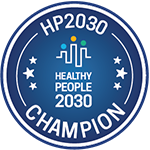
The Truth About Breast Cancer & Early Detection

October is Breast Cancer Awareness Month. This month, especially, we encourage women to take control of their breast health and share ways to do so with family and friends.
While breast health is important, ALL aspects of your health are important! To learn about other Women’s Health services and programs we offer, click here.
Monitoring your breast health is crucial. Breast cancer is one of the most diagnosed cancers among women in the U.S. according to the National Breast Cancer Coalition. In 2024 alone an estimated 310,720 women and 2,800 men will be diagnosed with invasive breast cancer.
The truth is, it could happen to you or someone you know.
Early Detection Can Save Your Life
Early detection practices – this includes doing monthly breast self-exams and scheduling regular clinical breast exams and mammograms – have been proven to save lives!

The American Cancer Society states that when breast cancer is detected early and is in the localized stage, the 5-year relative survival rate is 99%.
Read below to learn more about the recommended early detection methods.
Breast Self-Exams
You know your breasts better than anyone. By performing monthly breast self-exams – a check where you look at and feel each breast for possible lumps, distortions, or swelling – you will be able to more easily identify any changes in your breasts, such as:
- The appearance of the breast or nipple
- The way the breast or nipple feel to the touch
- The existence of nipple discharge (particularly clear discharge or bloody discharge)
Don’t wait. Be sure to talk to your healthcare professional if you notice anything unusual.
Breast Cancer Screening
Standard breast cancer screening methods include mammograms and clinical exams.
Clinical exams are performed in person by a trusted healthcare professional. During the exam, they will do a visual check of your breasts and a physical check of your breasts, checking them for abnormalities and warning signs of breast cancer. Your family physician or gynecologist will most likely perform this exam during your annual wellness exam.
A mammogram is an x-ray that examines breast tissue. The U.S. Preventive Services Task Force states that women should start receiving mammograms at 40. However, women with a higher risk of developing breast cancer may benefit from beginning regular mammograms at an earlier age.

While screening mammograms are only recommended for those over 40, the National Breast Cancer Foundation recommends that all women over 18 participate in annual clinical breast exams and monthly self-exams.
We’re Here to Help
Monitoring breast health and getting important tests can present challenges to some people for several reasons. Whether you’re looking to take control of your health or address existing health concerns, don’t hesitate to contact us.

GNR Public Health offers low- or no-cost breast exams, mammograms, and other breast imaging to low-income and uninsured women through the Breast and Cervical Cancer Screening Program (BCCP), a state and federally-funded screening and diagnostic program for women ages 40 to 64. Women under 40 who are experiencing problems with their breasts are also eligible to be seen.
In addition to the Breast and Cervical Cancer Screening Program (BCCP), we also process Women’s Health Medicaid applications for eligible women of all ages who are diagnosed with breast cancer.
GNR recognizes that breast cancer doesn’t just affect women. We also offer clinical breast exams for men who have discovered an abnormality. Funding is available for imaging, breast biopsies, and surgical consults for our male clients.
Don’t wait. Call us at 770-904-3717 and ask about breast cancer services today!


